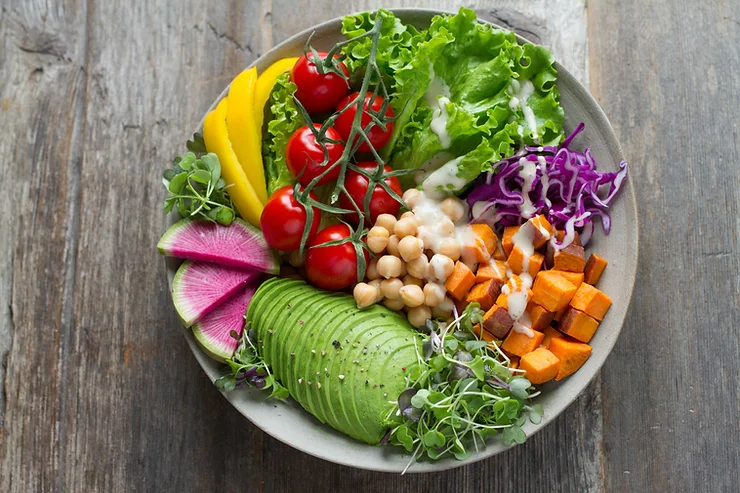Decrease Inflammation for Sustainable Weight Loss

What are the factors involved in maintaining healthy weight?
It is often said that the difference between people that are slim and people that are overweight is that people who are slim tend to eat when they are hungry and stop eating when they are full, Whereas people who struggle with their weight think a great deal about food, eat when they aren’t hungry and are less aware of when they are getting close to being full. I would add that a significant piece to knowing when we are full/satiated and “complete” is aided by having a healthy relationship and content connection to our body (being out of pain is huge!) and being “in our body” — exercise, movement (yoga, tai chi, dance, stretching) all facilitate this fine awareness of “how am I truly feeling?”.
There is also of course the issue of emotional eating. The food/mood connection is huge, the impacts of trauma and disconnection with parts of ourself that have been in pain and protected (for good reason) can be significant when it comes to holding on to weight. These are deep issues to explore and best done with the guidance of trusted and skillful practitioners. I work with this area a great deal. Women Food and God by Geneen Roth is an excellent book that explores this topic well.
All this said, I don’ t believe there is one way of looking at this complex and broadly impacting issue.
Calories in and calories out?
We commonly hear that the main factor to consider in weight loss is how many calories are going in (diet) versus how many calories getting burned (exercise). Physiologically speaking there are actually MANY factors involved in maintaining healthy weight.
If it were as simple, as “diet and exercise” , then reducing food intake and increasing “work outs” would work for everyone. We know this is not the case. I have seen many patients over the years who have struggled with weight loss, and have tried many different restrictive diets, and intense boot camps and fitness regimes to no avail. This is because there are many systems in our body that can affect how our metabolism works. And I am going to talk about a few.
HORMONES
Our endocrine system has a huge role to play — hormones –from adrenals (cortisol, DHEA), thyroid (TSH, T3) , pancreas (insulin) and sex organs (estrogen, progesterone, testosterone) to just name a few– these all impact how we use blood sugar, how we use energy, burn fat for fuel, store it for later use (fat cells).
As an ND, here is where I ask about stress levels, sleep, menstrual cycles, energy, mood– these all give a clue as to what system may be out of balance and look into testing hormones (blood, saliva or urine) to dig deeper for the underlying root cause of which systems are not functioning optimally and look at ways to a) remove the obstacles or b) provide the nutrients (food, vitamins, supplements, botanicals or medications) to allow for restoration of function.
DIGESTION
Our digestive system is another very big player. It isn’t always WHAT we eat (although quality and quantity IS important) but it is often HOW we eat. So here is where I like to look at :
What mode our nervous system is in:
Is it “Rest and Digest? (parasympathetic= digestive juices flowing for proper breakdown and metabolism of food) OR
Is it “Stress Mode” (sympathetic= elevated cortisol, shutting down digestion)
I also ask if there symptoms of dysbiosis: gas, bloating, reflux, burping, fatigue after eating? that would suggest a deficiency in HCL or pancreatic enzymes, a food sensitivity?
INFLAMMATION and the EMUNCTORIES
The EMUNCTORIES, our organs of elimination, are at the intersection of all of these systems (endocrine, GI and nervous systems). If these organs are functioning well, they can reduce the levels of inflammation in our body and “lighten our load” overall. The most well known organ of elimination is likely the LIVER.
I would say the Liver is the “It” organ of our century where pesticides, xenoestrogens and detoxification are part of our common lexicon.
All of our hormones and toxins must get metabolized through the liver. And all of the food that we consume is broken down and then carried via the portal vein from our GI tract (small intestine) to this very same organ –the LIVER to get filtered.
Our liver transforms and metabolizes all of our nutrients (vitamins and minerals, carbs and fats, into energy, storage or usable forms (energy!)
This is why “cleansing” and “detoxification” are so popular, and many people report weight loss during and after cleanse.
Anytime we do an anti-inflammatory diet and decrease the load on our liver, (and our other hardworking organs of elimination ) we are “cleaning up” liberating garbage — and shedding those unnecessary pounds is a beautiful byproduct of the process. Viva la liberation!
















